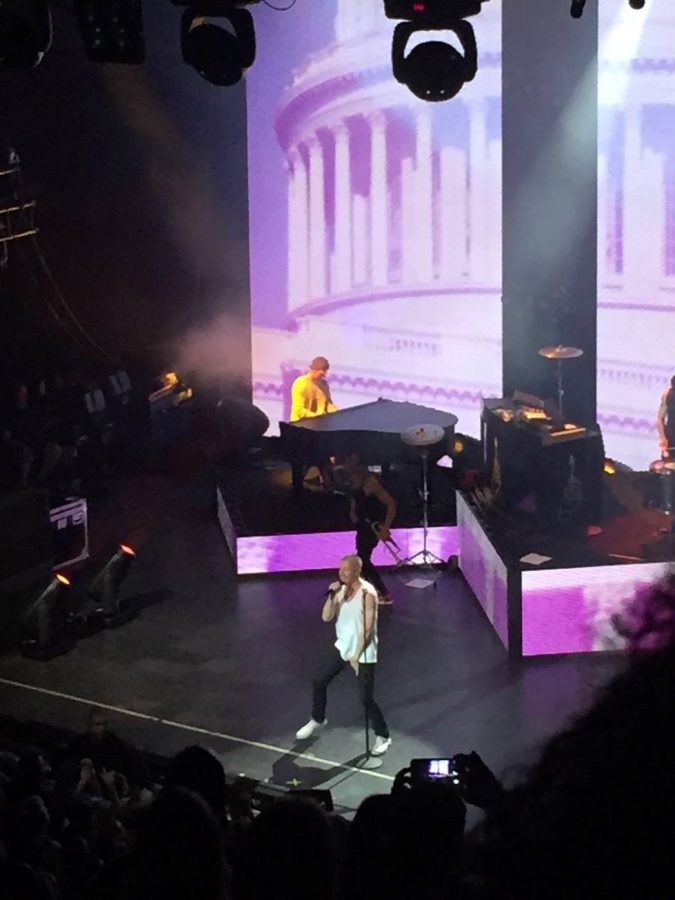We need more socially conscious music
Macklemore preforms live at the Riviera Theatre in Chicago, IL.
Editor’s Note: Veronica Wernicke is a freshman at UNCW majoring in Communication Studies and is a staff writer for The Seahawk. The opinions expressed in this article are solely those of the author. Veronica Wernicke may be found on Twitter @itsveronica98. All suggestions and inquiries may be sent via email to [email protected].
80 percent of rap and R&B songs are about partying, girls and drugs — getting turnt, if you will. As someone who isn’t intrigued by any of those things, that genre of music is one I usually steer clear of.
However, Seattle rapper Macklemore is different. He’s the 20 percent.
Yes, he’s rapped about thrift stores and mopeds, but he’s also addressed serious issues like drug and alcohol addiction, race, gay marriage and the problem of celebrities and corporations — especially pharmaceuticals — who are all about capitalism. In a world where today’s music is a mix of “poppy” EDM mixes that make us feel good, we still need to acknowledge and stand up for what we believe in and help make a change.
That is exactly what Macklemore is trying to do with his music.
In February 2016 Macklemore released his second studio album This Unruly Mess I’ve Made — a fitting title choice given the subjects of his music — which includes 15 songs that range from drug and alcohol addiction to white privilege, and much more.
NPR referred to Macklemore and his hip hop duo Ryan Lewis as a “brand of socially conscious rap,” which is definitely something we need with our current state of issues where white privilege can be seen as rising, there are not enough treatment centers for those who are substance abusers — ahem overdoses —and it seems every celebrity’s move is about making a buck.
According to the National Institute on Drug Abuse, drug overdoses have been on the rise since 2002 from around a mere 20,000 to over 50,000 in 2015. With these rises in overdoses, the nation still continues to spend over $4 billion — yes, you read that right, $4 billion — annually “fighting” the war on drugs, according to Elevations Health.
The war on drugs and substance abuse is a topic that hits close to home to Macklemore. He himself was addicted to drugs and alcohol for many years prior to and during his career. He has also lost many younger and older friends to overdoses — and not just from nonprescription drugs. This topic is a common thread throughout his latest album.
“And now my little brother is in the sky from a pill that a doctor prescribed. That a drug deal a million dollar industry supplied.”
Only six songs in, Macklemore, along with Leon Bridges, raps about a close friend who overdosed at 21 in “Kevin.” Instead of placing blame on his friend or family, he puts it on pharmaceutical companies and doctors who just sign prescriptions here and there in order to make a profit.
In a recent MTV documentary, Prescription For Change, and in a weekly Presidential Address in May 2016, Macklemore visited the White House and spoke with former President Obama on how they could better handle this said “war on drugs.” Not all drug addiction “starts in some dark alley. It often starts in a medicine cabinet,” said Obama in the documentary.
Macklemore gave personal insight to Obama about the topic, and they both believe that instead of spending billions of dollars arresting those who are substance abusers, there should be more money going into treatment centers to help them overcome their addiction. They believe in turn this will help our nation’s issues of addiction and overdoses — and the super high cost associated with it.
For the documentary, Macklemore released a new song to accompany it. In “Drug Dealer,” he sings and raps about the harsh reality of prescription drug abuse, which he himself suffered from. Similarly to “Kevin,” he blames doctors and pharmaceutical companies.
“My drug dealer was a doctor, doctor. Had the plug from Big Pharma, Pharma. He said that he would heal me, heal me, but he only gave me problems, problems.”
In the music video for “Drug Dealer,” Macklemore displays an honest depiction of drug abuse where he is sweating through his sheets, tossing and turning on his mattress and at a physical and mental war with himself.
Now what other artists are going to give you such a vulnerable, raw and personal song with an even more powerful message?
Definitely not The Chainsmokers or Kanye. They’re too busy singing about mattresses and how “amazing” they are.
In the very last song on the album, titled “White Privilege II,” which is a follow up of his 2005 song “White Privilege,” Macklemore opens up about his experience at a Black Lives Matter protest in 2014. Initially, he wasn’t going to speak out because being a white male rapper made him feel uncomfortable, but Macklemore was later encouraged by a fellow hip-hop artist to speak out because he felt with the following and platform Macklemore has, he could and needed to engage his audience.
In the song, he speaks about what his place is and how he could help speak up for a movement and people to whom he credits his career in hip-hop. He also criticizes artists like Miley Cyrus and Iggy Azalea, for taking from black culture and not giving — the same, if any — credit back: “are you marching for freedom or when it’s convenient?”
He calls for action of his audience to stand up and speak out: “we want to dress like, walk like, talk like, dance like, yet we just stand by. We take all we want from black culture, but will we show up for black lives?”
Macklemore isn’t the only artist to address social issues, just look at John Legend, Janet Jackson or Nas. However, if only more artists — like The Chainsmokers, Kanye, Adele or whoever you listen to — used their platform to speak up and advocate for issues like substance abuse and addiction, race, etc., then so many more people would listen and maybe — just maybe — things would change.
If we only listen to “feel good” music, then what good are we doing for ourselves and those around us? Yes, we all need an escape and music can create that, but if that’s the only purpose for music, then we need to reevaluate ourselves and what we stand for. We can say we stand up for these issues, but until we do something — like Macklemore — your so called “activism” is not worth it.







